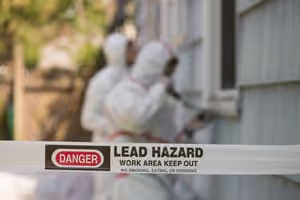
While the use of lead-based paint in the United States was banned in 1978, lead paint is still a significant cause of harm in the country. This is because many homes and buildings constructed before the ban may still have lead-based paint on their walls, which can continue to cause health problems.
Lead paint can pose a serious risk, particularly to children, as they may ingest paint chips or inhale dust containing lead, which can lead to lead poisoning. Lead poisoning causes a wide range of health issues, including developmental delays, learning difficulties, behavioral problems, and other serious health issues.
According to the Centers for Disease Control and Prevention (CDC), an estimated 24 million homes in the United States still have significant lead-based paint hazards, and more than four million households with children have high levels of lead exposure.
The positive news is that lead poisoning can be prevented. The key is to identify and eliminate sources of lead exposure in the home, such as lead paint, dust, and soil. This can be done through testing for lead, removing or encapsulating lead paint, and taking steps to reduce lead dust in the home. Additionally, it’s important for individuals to take steps to protect themselves and their families from lead exposure, such as washing hands and toys frequently and avoiding certain high-risk activities, such as sanding or scraping lead paint.
What are the symptoms of lead poisoning?
Lead poisoning has a range of symptoms, which can vary depending on the amount of lead exposure and the age and health status of the affected person. Some common symptoms of lead poisoning include:
- Abdominal pain: Abdominal pain, cramping, or constipation can occur as lead poisoning can affect the gastrointestinal system.
- Anemia: Lead poisoning can cause anemia, which is a decrease in red blood cells that can result in fatigue, weakness, and shortness of breath.
- Headaches: Headaches are a common symptom of lead poisoning.
- Irritability and mood changes: Lead poisoning can cause irritability, mood swings, and changes in behavior, particularly in children.
- Learning difficulties: Lead poisoning can cause learning difficulties, decreased intelligence, and developmental delays, particularly in young children.
- Loss of appetite: Lead poisoning can cause loss of appetite, weight loss, and stomach upset.
- Sleep problems: Lead poisoning can cause sleep problems, including difficulty falling asleep and staying asleep.
- Weakness: Weakness and muscle fatigue can occur as lead poisoning can affect the muscular system.
In severe cases, lead poisoning can cause coma, seizures, and even death. If you suspect that you or someone you know may have been exposed to lead, it’s important to seek medical attention immediately.
How to know that you have a lead poisoning claim?
If you believe that you have suffered harm as a result of exposure to lead, you may have a legal claim for lead poisoning. However, the specific requirements for filing a lead poisoning claim can vary depending on the laws in your state and the circumstances of your case. Here are some general guidelines to help you determine whether you may have a lead poisoning claim:
- Confirm the presence of lead: The first step in determining whether you may have a lead poisoning claim is to confirm that you were exposed to lead. This can be done through testing of your blood or through testing of the paint, dust, or soil in your home.
- Document your damages: To have a valid claim, you must have suffered harm as a result of the lead exposure. This can include physical injuries, such as developmental delays, learning difficulties, and other health problems, as well as property damage and economic losses.
- Establish liability: To pursue a claim for lead poisoning, you will need to establish that someone else was responsible for your exposure to lead. This can include landlords, property owners, contractors, or others who were responsible for maintaining or renovating the property where the exposure occurred.
- Meet the statute of limitations: Each state has a statute of limitations, which is the deadline for filing a legal claim. It’s important to consult with an attorney to ensure that you file your claim within the applicable time frame.
If you believe that you or your child have a lead poisoning claim, it’s important to consult with one of our experienced attorneys who can evaluate your situation and advise you on your legal options. The lead poisoning lawsuit attorneys at Parker Waichman LLP can help you gather the evidence needed to support a claim, negotiate with insurers or responsible parties, and pursue legal action if necessary.



.avif)
.avif)